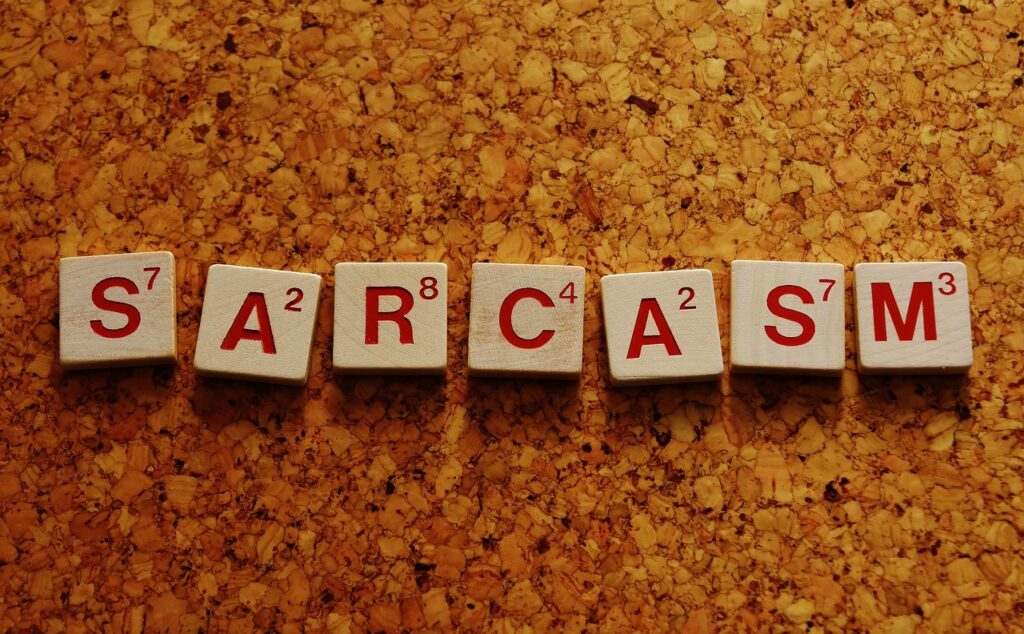
Explore & Play
Discover interesting topics and solve the accompanying crossword puzzle.
Scorn crossword | Learn about sarcasm’s impact
Table of Contents
Scorn crossword
You can either fill in the crossword puzzle directly on this page or click the button in the bottom right corner to print it for free.

The Art of Sarcasm: When Does Humor Become Hurtful?
Sarcasm, often celebrated for its wit and cleverness, walks a fine line between humor and hurt, leaving us to question: when does it cross the line? While sarcasm has its moments of brilliance, it can also create misunderstandings, foster resentment, and even damage relationships. This article dives deep into the complexities of sarcasm, exploring its role in communication, relationships, and society. To make this topic engaging, we’ve even created a crossword puzzle featuring sarcasm-related words for readers to explore and test their knowledge.
What is Sarcasm? A Linguistic and Psychological Perspective
Mockery as the Core of Sarcasm
Sarcasm derives its charm and complexity from its dual nature—an expression of humor that often carries a sharp edge. At its core, sarcasm typically relies on mockery, where a speaker says one thing but means the opposite. For example, saying, “What a great idea!” in a situation where the idea is obviously flawed illustrates sarcasm’s subtlety.
Why Sarcasm Often Invokes Contempt and Disdain
Psychologists suggest sarcasm is rooted in the human need to express frustration or highlight absurdities. However, sarcasm can easily invoke feelings of contempt when it’s perceived as disrespectful or belittling. This emotional sting often makes people associate sarcasm with disdain rather than wit.
Sarcasm in History and Culture
Ridicule in Ancient Texts: How Societies Used Sarcasm
From ancient times, sarcasm has been a powerful tool for criticism. In classical literature, sarcasm was used to mock authority and highlight societal flaws. Philosophers like Socrates often employed sarcasm to challenge others’ logic, while playwrights such as Aristophanes used it to ridicule political figures.
The Evolution of Derision in Modern Media
In modern media, sarcasm has taken on new forms, often intertwined with satire. Shows like The Daily Show and Saturday Night Live thrive on using sarcasm to mock politicians and public figures. While this derision can spark laughter, it also fosters a culture of scoffing at authority, creating a fine line between humor and disrespect.
The Thin Line: When Does Sarcasm Become Hurtful?
Belittling vs. Witty Humor: Where to Draw the Line
While sarcasm can elicit laughter, it can also provoke feelings of humiliation and disrespect when used carelessly. The distinction between playful teasing and belittling lies in intent and delivery. For example, sarcastic remarks in a group setting often humiliate the target, even if humor is the speaker’s intent.
How Derogatory Comments Disguise as ‘Just a Joke’
Sarcasm is frequently dismissed as “just a joke,” masking its potentially harmful effects. Derogatory comments, disguised under the veil of humor, can deepen emotional wounds and create lasting feelings of inferiority. Recognizing this disguise is crucial for understanding when sarcasm crosses the line.
The Psychology Behind Sarcasm: Why We Use It
Disdain as a Driver of Sarcastic Humor
Sarcasm often originates from feelings of frustration, anger, or disdain. People use sarcasm to criticize others without direct confrontation, giving them an emotional release. However, this indirect approach often leaves the recipient confused or hurt.
Sneering and Scoffing: The Body Language of Sarcasm
The delivery of sarcasm is as important as the words themselves. A sneer, scoff, or roll of the eyes amplifies the sarcastic tone, making the message unmistakably sharp. This body language can escalate tensions, turning a simple joke into a personal attack.
Sarcasm in Relationships: Bonding or Breaking?
When Sarcasm Turns into Verbal Abuse
Sarcasm can be a double-edged sword in relationships. While it can create moments of shared laughter, repeated sarcasm can lead to feelings of resentment. For example, sarcastic remarks about a partner’s habits may seem harmless initially but can turn into verbal abuse over time.
How to Avoid Humiliation and Build Healthy Communication
To avoid using sarcasm destructively, focus on building open communication. Expressing concerns directly rather than cloaking them in sarcasm fosters understanding and respect. This approach minimizes the risk of causing humiliation or contempt in relationships.
Public Scorn: Sarcasm in Social and Political Commentary
From Jeers to Rebuffs: The Language of Political Satire
In the public sphere, sarcasm often takes the form of pointed criticism aimed at figures of authority. Political satire thrives on sarcasm, using ridicule to expose flaws in governance. However, excessive sarcasm can alienate audiences, turning insightful commentary into scornful rebuffs.
When Condescension Alienates Audiences
Condescending sarcasm in public discourse can backfire, making the speaker appear arrogant. For instance, sarcastic comments during debates may amuse supporters but alienate undecided audiences, undermining the speaker’s credibility.
Constructive Sarcasm: Can It Ever Be Positive?
Criticism with a Purpose: Transforming Scorn into Insight
Sarcasm doesn’t always have to sting; when used constructively, it can inspire and provoke thought. Satire, for example, often highlights societal issues through witty sarcasm, prompting reflection and action.
How Sarcasm Challenges Disrespectful Norms
In some cases, sarcasm serves as a tool to challenge disrespectful or harmful norms. For example, sarcastic critiques of discriminatory practices can spark awareness and drive change.
Dealing with Sarcasm: A Guide to Building Resilience
Overcoming Humiliation and Belittling
Learning to navigate sarcasm requires emotional intelligence and a strong sense of self-worth. When faced with hurtful sarcasm, focusing on the intent rather than the words can help defuse the situation.
How to Respond to Sarcastic Criticism
Responding to sarcasm effectively depends on the context. Ignoring it can diffuse tension, while humor can redirect the conversation. For more severe cases, addressing the comment directly can set boundaries and prevent future instances.
Crossword Puzzle and Sarcasm: A Fun Way to Learn
Exploring sarcasm through a crossword puzzle adds an engaging twist to understanding its nuances. Words like “mockery,” “ridicule,” and “disdain” take center stage in this activity, offering a deeper grasp of sarcasm’s role in communication. Playing the crossword can be both educational and entertaining, offering a fresh perspective on a familiar topic.
The Double-Edged Sword of Sarcasm: Finding Balance
Sarcasm remains a complex form of communication—capable of making us laugh but also cutting deep when used recklessly. By understanding its nuances and using it mindfully, we can appreciate sarcasm’s humor without crossing the line into hurtful territory.
Take a moment to reflect on sarcasm’s impact in your life, and test your knowledge by playing our crossword puzzle! Challenge yourself and uncover how much you really know about the art of sarcasm.
Share to...
I hope you enjoy the content.
Want to receive our daily crossword puzzle or article? Subscribe!
You may also be interested in
Share to…
Want to receive our daily crossword puzzle?
-
Jigsaw Puzzles
Autumn Whiskers and Pumpkin Paws Puzzle 250 | 300 | 500 Pieces
kr 348,00 – kr 439,00Price range: kr 348,00 through kr 439,00 Select options This product has multiple variants. The options may be chosen on the product page -
Jigsaw Puzzles
Enchanting Unicorn Watercolor Jigsaw Puzzle 250 | 300 | 500 Brikker
kr 348,00 – kr 439,00Price range: kr 348,00 through kr 439,00 Select options This product has multiple variants. The options may be chosen on the product page -
Jigsaw Puzzles
Enchanting Four Sheep Zodiac Jigsaw Puzzle 250 | 300 | 500 Pieces
kr 348,00 – kr 439,00Price range: kr 348,00 through kr 439,00 Select options This product has multiple variants. The options may be chosen on the product page

















